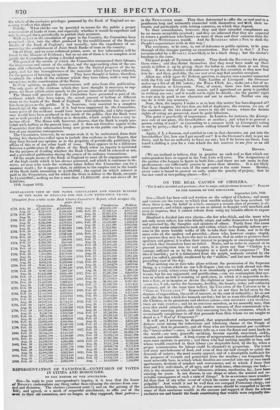REPRESENTATION OF TAVISTOCK-CONFUSION OF VOTES IN CITIES AND BOROUGHS.
TO THE EDITOR OF THE SPECTATOR.
Sra-In reply to your correspondent's inquiry, it is true that the house of RUSSELL contemplates any thing rather than releasing the electors from con- trol and dictation. The electors (innocent souls !) met on the passing of the Bill; and agreed, as a mark of respectful attachment, to offer one of the mate to their old connexion, now no longer, as they supposed, their patron-- in the NEWCASTLE sense. They then determined to offer the semnd seat to a gentleman long and intimately connected with themselves and with their in- terests, and particularly with mining concerns, on which they depend. To their astonishment, however, they and their intended compliment are by no means acceptably received ; and they are informed that they are expected to return a gentleman who knows no more of them and their concerns than Sir CHARLES WETHERELL would. And the RUSSELLS select a Fox to dash the People's expectations with in this way ! The ceremony, to be sure, is, out of deference to public opinion, to be gone through of this stranger passing an examination. But what is that ? A Fox recommended by a RUSSELL is not likely to be a black sheep ; but the elector's bondage is the same. The good people of Tavistock submit. They thank the RUSSELLS for giving them votes ; and they flatter themselves that they must have made up their minds to follow it up by giving them the ballot to enable them to use them freely. If not, the electors will endeavour to get this essential, as they now find it to be : and then, probably, the one scat even may find another occupant. Allow me, while upon the Reform question, to inquire into a matter connected with the City and Borough lists. Take London or Liverpool : the Overseer makes up a list of all 101. voters ; the Town Clerk, &c., make nut a list of re- sident freemen or Liverymen. Now, of course, these two lists necessarily sack comprise many of the same names, and I apprehend no party is justified in striking any out ; and it would not be right he should,-for the parties' right to vote maybe good in one character and not in another. Neither can any one do it with any accuracy.
Now, then, the inquiry I make is as to bow this matter has been disposed of? For if, as I suppose, the two lists are full of duplicates, the returns, we see, of the numbers of the two classes of voters in the old towns, where the former rights of voting are preserved, must be quite fallacious.
The point is practically of importance. In London, for instance, the Livery- men vote at one place, the householders at another ; and what is to prevent a person voting at each ? or (according to a common trick at Liverpool) voting at one by proxy,-that is, by a person calling himself by the name of the real voter?
Again, if I, a freeman, and entitled to vote in that character, am put into the householders' list, how can I get myself out? It is the Overseer's duty to put me there, and he has no authority to leave me out ; but if he leaves me there, lam taxed a shilling a year for a vote which the Act reserves to me free as an old voter.
[We are inclined to believe, that in practice no such evil as that which our correspondent fears in regard to the Vote Lists will arise. The designations of the parties who happen to figure in both lists-and there are not many in that predicament-are sufficiently precise to prove their identity. It is not likely that there should be two men of the same name in the seine house. Besides, every voter is bound to answer on oath, under the penalty of peijury, that he has not voted at two polling-places.-En.]


























 Previous page
Previous page